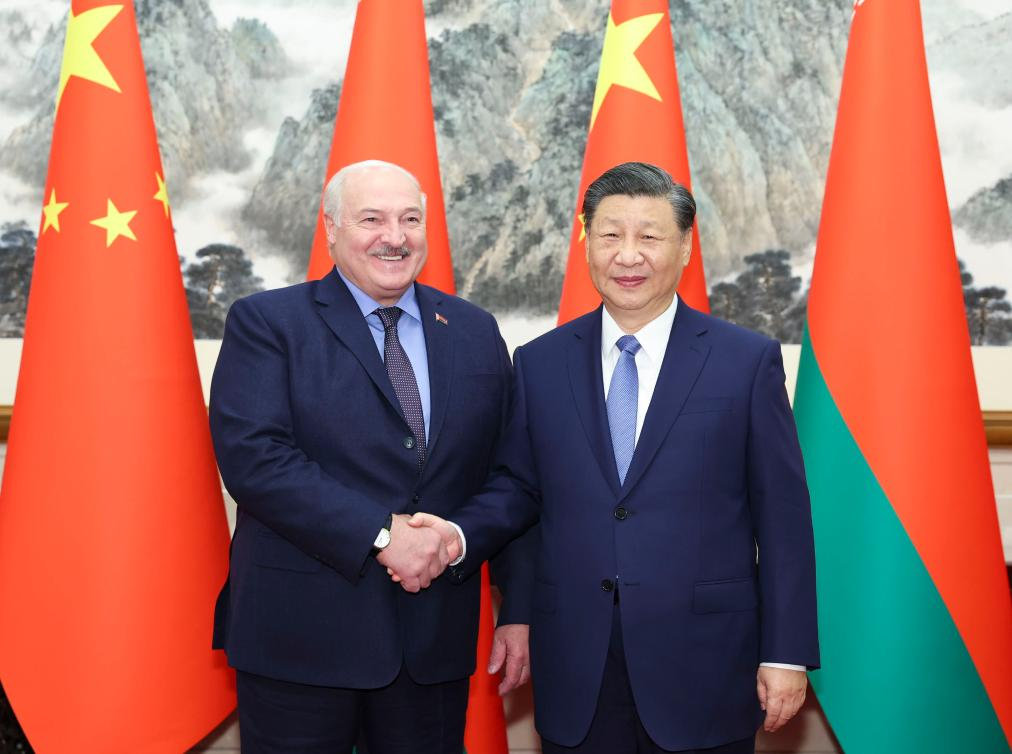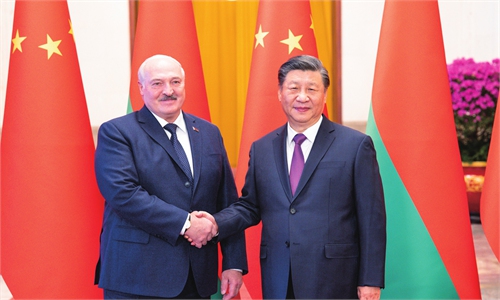
Chinese President Xi Jinping meets with Belarusian President Alexander Lukashenko in Beijing, capital of China, Dec. 4, 2023. Photo: Xinhua
Chinese President Xi Jinping met with Belarusian President Alexander Lukashenko in Beijing on Monday. Aside from vowing to deepen bilateral ties and strengthen cooperation, Xi told Lukashenko that China firmly supports Belarus in pursuing a development path suited to its national conditions, and opposes external interference in Belarus' internal affairs.
Lukashenko visited China from February 28 to March 2 this year. Chinese experts said it showed the special importance Minsk attaches to relations with Beijing, as well as Belarus' intention to "look East." Observers believe that China's ties with Belarus will be further consolidated via seamless bilateral cooperation, strong political trust and staunch support for each other on multilateral platforms.
According to the Xinhua News Agency, Xi pointed out that he and Lukashenko reached important consensus on promoting the high-level development of China-Belarus relations during Lukashenko's state visit to China earlier this year. The two countries have strengthened political mutual trust and international coordination since then.
China always views its relations with Belarus from a strategic and long-term perspective, firmly supports Belarus in pursuing a development path suited to its national conditions, and opposes external interference in Belarus' internal affairs, Xi said.
"China is willing to continue to strengthen strategic coordination with Belarus, firmly support each other, promote practical cooperation and deepen bilateral relations," Xi said.
Xi stressed that more than 150 countries have signed Belt and Road Initiative cooperation documents a decade after he proposed the initiative, adding that he announced not long ago eight major steps China would take to support the joint pursuit of high-quality Belt and Road cooperation. "China welcomes Belarus to continue its active participation and gain more tangible development opportunities from it."
Xi called on the two sides to implement projects such as the China-Belarus Industrial Park, push for more results in industrial cooperation, and further facilitate cross-border transport to promote trade and personnel exchanges.
He said both sides should expand cooperation in education, health, sports and tourism, support exchanges and cooperation between the youth, and enhance understanding and friendship between the two peoples.
Noting that China and Belarus are important forces in the reform and development of the global governance system, Xi said China is willing to strengthen coordination and cooperation with Belarus within multilateral mechanisms such as the United Nations and the Shanghai Cooperation Organization, promote the implementation of the Global Development Initiative, the Global Security Initiative, and the Global Civilization Initiative, and advance the building of a community with a shared future for humanity.
Belarus sincerely hopes that China will grow stronger, as this is conducive to peace and progress in the world, Lukashenko noted.
Belarus is committed to developing friendly relations and is willing to keep close high-level exchanges with China, firmly support each other, deepen mutually beneficial cooperation, strengthen international and multilateral strategic coordination, and push for greater development of the all-weather comprehensive strategic partnership, Lukashenko said.
The two heads of state also exchanged views on the Ukraine crisis.
Two visits within a year is not common, and shows that Belarus is attaching more importance to China on both diplomatic and economic fronts, said Zhang Hong, a research fellow at the Institute of Russian, Eastern European and Central Asian Studies of the Chinese Academy of Social Sciences.
Zhang said this importance is being further highlighted as Belarus faces sanctions from the Western countries and is "turning East." "As the world's second largest economy, more of the China market can benefit Belarus, and economic cooperation was an important topic of Lukashenko's visit this time," Zhang noted.
Discussion on the development of China-Belarus Industrial Park is another important topic on the agenda of the Belarusian president's visit. "The park has been thriving in recent years thanks to its natural appeal as well as Belarusian government support. However, Western sanctions have had a certain impact on its development. How to steer away from that negative influence is an issue for discussion."
When the Global Times reporters visited the park in August this year, Deputy Director General of the Industrial Park Development Company, Ren Fei, told the Global Times that the park has adjusted its source structure for attracting investment in order to alleviate the geopolitical impact, such as focusing more on the Eurasian Economic Union market, as well as on investments from member countries of the Shanghai Cooperation Organization. Several banks in Belarus have also received assistance from the park in accessing the Chinese yuan payment system.
Cui Heng, an assistant research fellow from the Center for Russian Studies of East China Normal University said that Xi's mentioning of opposition to external forces interfering in Belarus' internal affairs demonstrates a high degree of political trust between the two countries.
"Preventing color revolutions is of great concern for Belarus, which suffered riots in 2020 during a presidential election. And next year, the country is going to have parliamentary elections," said Cui.
Certain Western countries haven't given up their attempts to stir up color revolutions in some non-Western countries, thus, doubling down on opposing foreign interference at this juncture shows China's support for its efforts to defend its political security and stability, and that cooperation in this area is an important component in bilateral relation, according to Cui.
As for the Ukraine crisis, Zhang said it is not a priority of Lukashenko's visit, as "China and Belarus share a similar stance on the crisis, which is for the conflict to stop and spillover effects to be prevented. Both countries also strongly oppose Western countries' use of sanctions as a weapon to interfere," according to Zhang.
When meeting with Lukashenko in March this year, Xi said that "China's position boils down to supporting talks for peace," calling for adherence to the direction of political settlement, abandoning the Cold War mentality, respecting legitimate security concerns, and helping forge a balanced, effective and sustainable European security architecture.


